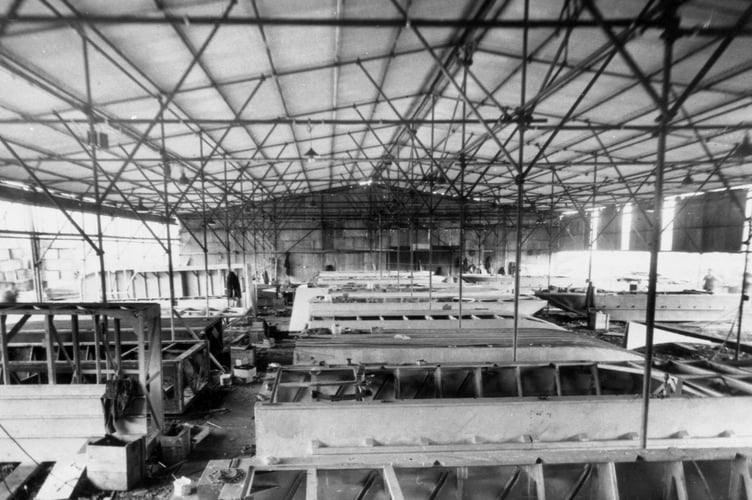New Year’s Day marked the 50th anniversary of the start of the ‘three-day week’ in the early months of 1974.
This was one of several measures introduced in the UK by Edward Heath’s Conservative government to conserve electricity during prolonged industrial action by coal miners and railway workers. From January 1, 1974, commercial users of electricity were limited to three specified consecutive days’ consumption each week.
This had far-reaching consequences for local businesses until the measures were lifted on March 7, 1974, as reported in the January 4, 1974, edition of the Farnham Herald...
Back to work as crisis hits the small firms
WITH the compulsory three-day week coming into force on January 1, the power crisis began hitting local firms with a vengeance.
Many Farnham businesses dependent on the use of electricity were brought to a complete standstill after the New Year Bank Holidays; employees at other premises returned to work in dim and chilly offices and workshops and were sent home when the afternoon darkness began to close in.
Factories in the Farnham area are allowed to use electricity on Thursdays, Fridays, and Saturdays only, while shops are subject to different rules – allowing them electrical power during specified hours in either the morning or the afternoon during the week and during both periods of the day on Saturdays.
The main exemptions are public services, businesses connected with the processing, packaging or distribution of food, and newspapers. Laundries, launderettes and dry-cleaning establishments also remain unaffected.
On the small industrial estate at Hookstile Lane, Farnham, there was very little activity on Wednesday. Many premises were locked up and in the darkness. In other buildings, managing directors battled on alongside office and works staff to keep the cogs turning. Paraffin heaters, camping lanterns and topcoats and scarves were the order of the day.
At the hydraulic engineering firms of F and W Industrial Supplies Ltd, managing director Mr D Fountain-Barber said that the crisis was causing his firm difficulties but that they were not insurmountable; it was matter or re-phrasing their work programme so that processes dependent upon electricity were carried out in the three “power days”.
But on days without electricity they were losing about two hours because of the lack of light.
The bulk of the firm’s work involves repairs to refuse vehicles owned by the local authorities, and this service was already being badly hit, said Mr Fountain-Barber. Even if they succeeded in getting exemption, a shortage of parting supplied by other firms would eventually catch up with them he warned.
At the moment they were willing to run the firm to a point here there was no profit at all – but beyond that employees and management alike has agreed to accept percentage reduction in salary. And if matters worsened still further they would be forced to close down completely.
“If the present situation continues,” he prophesised, “I would give us about six weeks before this point is reached.” F and W employ about 13 people at the Farnham works.
Another firm on the estate, W Newell Precision Engineering, was deserted. The firm relies on machinery and is unable to operate on days when the use of electricity is prohibited. Newels do a large amount of work for their neighbours, F and W Industrial Supplies Ltd.
Martinair Limited (about 1,200 employees) returned to work yesterday.
During the morning the firm was holding meetings “to formulate a plan to deal with the situation”. They were hoping it would be possible to continue working for more than the three days, a spokesman said. But until they has discussed the matter fully this was uncertain.
Another of Farnham’s largest employers, Crosby Doors Ltd, were also back in operation on Thursday for the first time since Christmas.
Marketing manager Mr BT Broderick said that the firm’s offices would operate normally but that on days without electricity the bulk of works employees would have to be laid off. However, they had a guaranteed wage at the moment it should be possible to continue paying them in this way “for several weeks”.
Crosby’s biggest problem was the most of their processes were highly automated, Mr Broderick pointed out. But they hoped to be able to carrying out a certain amount of assembly work on days when there was no power.
Crosbys employ a total of 450 at their Farnham works.
Shops are being allowed only three hours of electricity each say – during specified hours. But many have standby lighting and are continuing “business as usual”.
At Woolworths in The Borough the manager said that they were permitted to use electricity for the cash registers at all times, and there were finding their main problem in the storerooms rather than in the store itself. Behind the scenes they were having to find their way around with torches.
But even during periods when lighting was permitted he was “trying to be patriotic” and using less wattage per square foot that he was allowed.
At other times, camping lanterns were being used to light the store. But one heartening note was that none of employees would have to be sent home – they would all continue working a full week.
It has to be hoped that all shop employees will be as fortunate – for since amendment of the regulations allowing restricted lighting every day instead of lighting all day for only part of the week, this type of worker has lost some rights to unemployment benefit (benefit is only payable for an entire day without work).
At the employment exchange in East Street, Farnham, business was quiet on Wednesday, and manger Mr J Fulcher was expecting the situation to remain much the same for two or three weeks at least.
“Most of the employers have voluntarily guaranteed a 40-hour week,” he explained. “And they will be able to keep it up for two or three weeks, the we can expected to be flooded with people claiming unemployment benefit.”
Mr Fulcher issued a plea to employers facing a three-day week to pay unemployment benefit at their own premises instead of sending employees to the exchange. Staff at the Department are fully briefed to explain to local companies about the benefit due to workers and how to operate the payment scheme.
And if this method of payment is followed, it should be possible to avoid the “dole queues” nobody wants to see.
What do you remember of the Three-Day Weeks in early 1974?
Share your memories by emailing [email protected]




